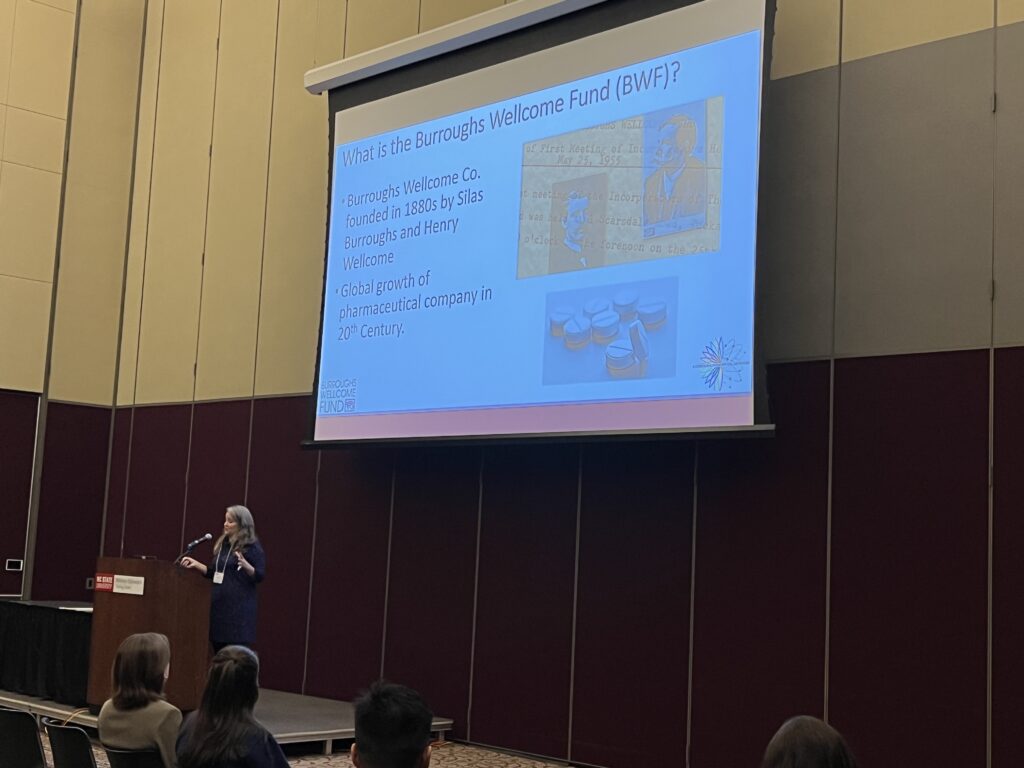Integrative Symposium of NC State Training Grants
The Integrative Sciences Initiative, in collaboration with NC State’s Comparative Medicine Institute, hosted the Integrative Symposium of NC State Training Grants on February 9, 2024. The symposium featured five NIH training programs on campus including the Molecular Biotechnology Training Program, NC State Comparative Medicine and Translational Research Training Program, Molecular Pathways to Pathogenesis in Toxicology, Chemistry of Life Training Program, and Comparative Molecular Medicine Training Program to highlight their efforts in improving human and animal health. The event was held at the McKimmon Center and began at eight in the morning when all the attendees could network over light breakfast. By 8:15, attendees moved to the auditorium and the first of the student talks started. Graduate student speakers represented different programs and presented their progress on their research topics they had been working on for a good few years! Topics varied and included research on circadian rhythm, immunology, gene expression, and aspects of different microbiomes.

After two sessions of student talks, we had our first keynote speaker—Dr. Fyodor Urnov with the Innovative Genomics Institute. The Innovative Genomics Institute is the result of partnership between two prominent research universities, UC Berkeley and UC San Francisco. In his talk, Dr. Urnov explained how CRISPR gene editing technology has been able to combat certain rare diseases and has the potential to help many others. Even though CRISPR treatments have proven effective, for-profit companies deemed the treatment “not commercially viable” due to the development costs involved. On the patient side, the cost of treatment can reach nearly two million dollars per person. Hence, the Innovative Genomics Institute, the world’s only academic and non-profit partnership organization focusing on CRISPR, was recently founded to make CRISPR cures available to all without the cost being a barrier between life or death by streamlining the development and approval process. Dr. Urnov then ended his talk with an important quote by poet and activist Amanda Gorman that read: “Merge mercy with might and might with right.”

Following another session of student talks, lunch began around noon. Poster presentations commenced soon after lunch. Graduate students stood next to every poster board with their respective posters. The committee of judges spoke with and listened to the diversity of student research. A few of the topics included “Developing an Angelman Syndrome Stem Cell Model for Drug Screening”, “Next Generation of Vancomycin Antibiotics”, and “Of Pigs, Mice, and Men: Transcriptomics of the Gastrointestinal Epithelium.”

After the poster presentations, Dr. Tammy Collins, program officer at Burroughs Wellcome Fund, began her presentation. Burroughs Wellcome Fund is a private, non-profit organization that strives to provide funding for and advance biomedical research and other academic initiatives and was a proud sponsor of the Integrative Symposium of NC State Training Grants. Dr. Collins’ talk focused on best practices for writing successful grants, an important skill for trainees to develop.

At three in the afternoon, keynote speaker Dr. Lacramioara Bintu, assistant professor of bioengineering at Stanford University, began her talk about the advances in genomic technology development. Her work focuses on gene expression and chromatin perturbation and the importance of understanding these processes to be able to apply it in the healthcare field. By controlling gene expression through CRISPR technologies and having effector domains activate and repress target genes, we can understand gene silencing and memory of chromatin modifications. Chromatin regulators control gene transcription through regulation of histone modifications and chromatin remodeling. However, there are also challenges with full length chromatin regulators as sometimes you need multiple if not the entire complex (chromatin) to get the desirable effects and that sometimes it’s hard to deliver. As a result, her team at the Bintu Lab and other experts in the field propose using natural effector domains from human transcription factors which essentially recruit in the same manner as the transcription factors though it can be retargeted to other genes. In this growing field of study, scientists strive to continue identifying compact regulators that can recruit endogenous complexes.

Image Source
After the last session of student talks, it was time for the poster award presentation. The winners were Alejandro Valdes presenting on “Next Generation of Vancomycin Antibiotics” under Dr. Joshua Pierce, Caroline McKinney-Aguirre presenting on “Epithelial Reparative Capacity is Enhanced by Acellular Placental Extract in Neonatal Porcine Models” under Dr. Liara Gonzalez, and Sydney Welch presenting on “Enhancing the Combinatorial Biosynthesis of Polyketides through Acyltransferase Engineering” under Dr. Gavin Williams.

The Integrative Symposium of NC State Training Grants was a successful event which came to a conclusion in the late afternoon of February 9, 2024. Plans have already begun for next year’s collaborative symposium!
- Categories: